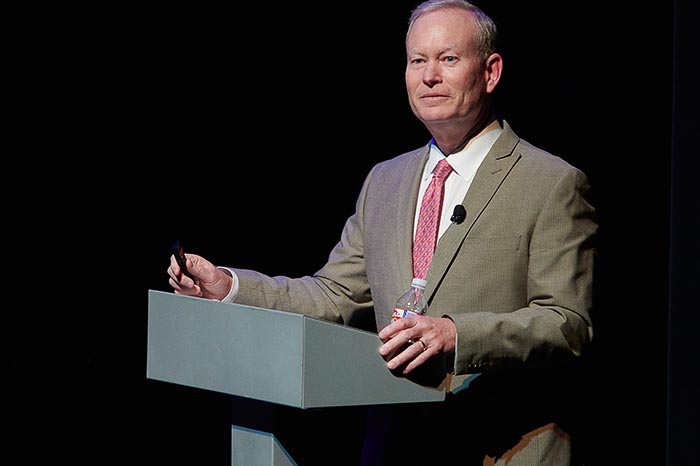Urbanization, the movement of people from one place to a larger city, will continue throughout America in the future and the mid-sized cities of today will be the new, large cities of tomorrow, according to Cornett.
By 2050, nearly 70 percent of humanity will live in cities, yet 60 percent of those urban spaces have yet to be built. Cornett said, "How we build these new cities is a key question for world leaders."
Cornett highlights the re-branding Oklahoma City has achieved since the 1990s. Prior to the re-branding effort, Oklahoma City had among the worst economies in the nation after the oil bust of the 1980s and many sympathized with citizens following the bombing in 1995 that killed 168 people and hundreds injured.
"We can't build an economy on sympathy," Cornett said in reference to the bombing tragedy. "We've got to improve our brand. We can't be branded by tragedy. We can't allow our brand to be branded by things that we have so little control over."
In order to re-brand Oklahoma City, Cornett focused on four key principles, which included:
- Economic strength and diversity through building wealth, jobs and opportunity.
- Civic pride and social cohesion to create places people want to call home.
- Creating a culture of wellness through honest conversations about tough topics, like obesity.
- Building strong, sustainable cities with walkable, active city spaces.
To grow economic strength, Cornett and the mayors before him knew Oklahoma City needed to invest in itself, so they approved tax legislation called Metropolitan Area Projects, or MAPS, to reinvest in the city. Through the additional sales tax, the city was able to build new amenities, including schools, libraries and a debt-free NBA arena.
"You're not going to have cities with low standards, attracting businesses with high standards. And you're not going to be attracting people if you aren't investing in the future and investing the quality of life," Cornett said. "And really, that's been the story of Oklahoma City. It was when we started investing in ourselves, that good things started to happen."
From the urban development improvements, Cornett turned his focus on uniting the city with an NBA or NHL team. Through persistence and becoming "the mayor that just won't go away," according to the NBA commissioner at the time, Cornett was able to move the Seattle Sonics, now the Oklahoma City Thunder, to move in the new arena. Not only did the NBA team bring in money, but it also promoted civic pride and social cohesion.
To create a culture of wellness and build a sustainable city with active spaces, Cornett targeted the city's obesity rates by putting the city on a diet and supporting the citizens with parks and active spaces to achieve the city's weight loss goal of 1 million pounds.
"For the first time, the veil had been lifted," Cornett said. "Church pastors were talking about it at the pulpit and creating support groups. Losing weight is hard, and it's always easier to do something if you feel like people are there supporting you.
"Well, in this case, the entire city was a support group. And it has changed the concept of what a community can do, and what should be its priority. We took something that wasn't the main discussion, and made it something we become proud of," he said.
With these four principles in mind, Cornett highlighted other smaller-sized cities making big moves, including Des Moines, Tulsa, Columbus and Louisville. According to Cornett, Des Moines embraced their traditional roots in agriculture and insurance by incorporating more tech and harnessed their culinary influence to become a "foodie capital," Tulsa brought their people together with a $450 million park, Columbus embraced new technologies with the goal of becoming the capital of autonomous vehicles, and Lousiville's leadership embraced compassion and kindness as their cornerstone tenets.
Cornett said through cohesive leadership and defined goals, all of these cities are able to redefine themselves through their urban successes.
"We need to be thinking about what type of cities we're going to create and then set out a plan on how we're going to create them," Cornett said. "Because only those cities that do those types of things are going to win in this race to attract the highly educated 20-somethings that every city is trying to bring in."

